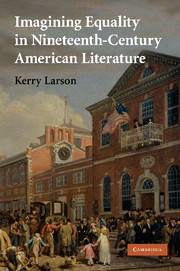4 - Comparatively speaking
Published online by Cambridge University Press: 04 May 2010
Summary
In Democracy in America, envy is a recurrent theme. Called at one point “the democratic sentiment,” it is distinguished from a “legitimate passion for equality which rouses in all men a desire to be strong and respected.” With the spread of democracy, envy progresses from an infirmity confined to one's own rank or caste to a genuinely public menace. Two salient features of democratic life, equality and mobility, are the perfect ingredients to insure its diffusion, for while an egalitarian culture renders comparisons among one's peers easy to make, the loosening of longstanding barriers to social mobility associated with the onset of equality also makes departures from the norm easy to see. “In democracies,” Tocqueville explains, “private citizens see men rising from their ranks and attaining wealth and power in a few years; that spectacle excites their astonishment and their envy; they wonder how he who was their equal yesterday has the right to command them today.” To ward off humiliation, the envious must concoct a plausible story to explain away the success of their rival: “[t]o attribute his rise to his talents or his virtues is inconvenient, for it means admitting that they are less virtuous or capable than he. They therefore regard some of his vices as the main cause thereof” (221). The reader of Democracy in America is likely to run across envy's submerged but pervasive influence in any number of domains, whether it be in the unmistakable mediocrity of the nation's elected officials (199), the contempt visited upon free blacks in Northern cities (355), or the intolerance of nonconformity in a country that supposedly prides itself on it (436).
- Type
- Chapter
- Information
- Imagining Equality in Nineteenth-Century American Literature , pp. 107 - 136Publisher: Cambridge University PressPrint publication year: 2008

